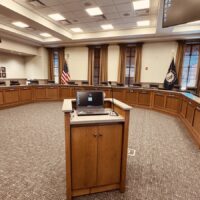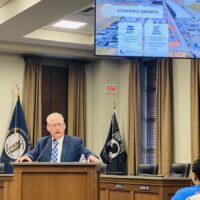Ward 1 Councilman Darvin Adams believes city council didn’t fully understand the impact when it reduced the Inner-City Residential Enterprise Zone budget from $500,000 to $400,000 this fiscal year, and he wants to see that funding restored.

“We need that $100,000 back,” Adams said during the Inner-City REZ board meeting Wednesday.
Concerns about the Inner-City REZ budget stem, in part, from the growing burden of dilapidated structures – that have been abandoned in many cases by owners – in Hopkinsville’s oldest neighborhoods.
At its August meeting, the board approved a financial plan to handle demolition work for 35 residential properties, which combined will cost between $175,000 and $182,000. The board moved approximately $98,000 from its current balance to demolition and also obligated $100,000 from the city’s recent $400,000 allocation for the 2019-20 fiscal year.
Since its creation several years ago, the city has put $500,000 annually into the Inner-City REZ, which has several programs aimed at improving the inner-city. Among those is housing rehab and demolition.
Several members of the ICREZ board, along with Community and Development Services officials who provide staff support for the board, have said the city misunderstood the board’s finances when making a funding decisions for agencies and boards this year. It appeared the ICREZ board had a large balance but most of the funds were already obligated.
Meanwhile, city officials are exploring ways to reduce the burden of dilapidated housing.
One component of Inner-City REZ board’s work is creating safe neighborhoods, and that ties to removing abandoned structures that are seen as harbors of crime, said CDS Executive Director Steve Bourne.
Ideally, local officials prefer to work with property owners who will make an effort to clean up and rehab their real estate, he said. But when that doesn’t happen, the properties go through the Code of Ordinance Enforcement Board.
“Most of these homes have been submitted to us by adjoining property owners,” Bourne said.
When a property is deemed in violation of local codes, the owner is cited and given 45 days to submit a work plan to repair the property.
“If they do not come in, which is normally the case, then there is an order to tear it down,” Bourne said.
Liens are filed in an effort to recoup the money spent on demolition, and later on mowing the property, but to date the city is owed more than $2.3 million in uncollected obligations from property owners.
Meanwhile, numerous nuisance properties have not yet gone through the process of being cleared for demolition, and that means the unpaid lien tally will likely grow.
Adams said he will lobby to have $100,000 restored to the ICREZ so it can continue work on housing and other efforts.
Other board members gave ideas to address problems with housing in the inner-city.
Ruth Lynch said ICREZ needs to improve its marketing so residents know the program’s goals and how they can request help to keep their properties from devolving into demolition targets. In addition, the larger problem of dilapidated housing needs to be a key focus of the Community Vision Plan, which the Chamber of Commerce is currently updating. Bourne said he agreed.
She also called on the board to be more accountable.
“What are we doing as a board to measure that the messages are getting out there and getting out there accurately? There’s got to be a sense of accountability for the board,” she said.
Board Co-Chairman Charles Turner said a board retreat needs to be scheduled so the members can refocus their efforts.
Jennifer P. Brown is co-founder, publisher and editor of Hoptown Chronicle. You can reach her at editor@hoptownchronicle.org. Brown was a reporter and editor at the Kentucky New Era, where she worked for 30 years. She is a co-chair of the national advisory board to the Institute for Rural Journalism and Community Issues, governing board past president for the Kentucky Historical Society, and co-founder of the Kentucky Open Government Coalition. She serves on the Hopkinsville History Foundation's board.





